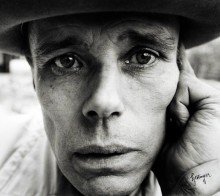Friday 5th December 2014, 7.30 for 8 pm
The Chapel in the Garden (Rax Lane entrance), Bridport, £6 entrance
Beuys believed that ‘all around us the fundamentals of life are crying out to be shaped, or created’. All human beings are creative and must together bring that creativity to bear in shaping/forming society – a process he called ‘social sculpture’.
By the 1970/80s Joseph Beuys was one of the most influential and controversial artists in Europe. However, his formative experiences were marked by trauma. In 1940, aged 19, he was drafted into the Luftwaffe and later shot down over the Crimea. After the war, abandoning his studies in natural science, he chose to attend the Düsseldorf Academy of Art. His wartime experiences soon caught up with him and he suffered a severe mental and physical collapse.
He went on to confront the collective guilt of the German nation in his work Auschwitz–Demonstration (1975), provocatively placing his trade-mark material- fat- on the elements of a burner.
His installation Economic Values, and action Sweeping Up directly confronted Germany’s post-war division. Eurasian Staff, an earlier action, had already suggested that renewal might come by combining the more meditative way of the East with the West’s analytical, logical approach.
In 1982, just four years before he died, he embarked on perhaps his greatest social sculpture 7,000 Oaks, a project that he hoped would spread out across the world.
Cliff Gorman taught physics for five years. Concerned by the possible catastrophes that might arise from the potential misuse of atomic and nuclear physics, he moved from ‘science to the soil’ and began a research into the use of plants in sculpture. This led to the discovery of 7000 Oaks. For the last ten years he has continued to study Beuys’ work, visiting the Joseph Beuys Archive in Kleve on many occasions.
‘what loneliness/ to be blind in broad daylight-/and deaf, what loneliness/ when the song’s in full swing’
Lectures on Everything Telephone: 078 33 79 56 29; (01308) 458 116
Email: [email protected]
A Lectures on Everything series
Ten years ago Milan Kundera, the Czech novelist now resident in France, defined provincialism as ‘the incapacity (or the refusal) to see one’s own culture in the wider context.’ The ‘provincialism’ he had in mind was literary. His reflections may seem out of touch in the pragmatic Europe our media have accustomed us to, in which it is to economics that the last word is usually given.
Yet Kundera’s definition of provincialism fits the UKIP narrative surprisingly well. He distinguished between the provincialism of large countries and that of small ones. In large ones there is a temptation to view one’s own literature as ‘so rich there is no need to interest oneself in what people write elsewhere.’ Something akin to this feeling obviously informs the idea that the United Kingdom can declare itself meaningfully ‘independent’ of the forces now shaping Europe and the wider world.
Provincialism in small countries takes a different form, Kundera argued. The wider culture is held in high esteem but it is ‘distant, inaccessible, a reality with which their national literature has little to do.’ Small countries are more possessive of their writers, surrounded as they are by an indifferent world. To participate in the larger culture becomes a betrayal. Here again: the need to escape small country provincialism might surely help to explain why so many travelled west after 2004. Might Europe’s current infighting not be described as, in many ways, a ‘clash of provincialisms’?
Over this winter and coming spring our series of lectures will attempt to look beyond the provincialisms, whether ‘big’ or ‘small’, to some of the novelists, philosophers, film-makers, lawyers, poets, artists and historians whose insights our public culture has perhaps been overlooking, to its own detriment.
Ioana Morpurgo







